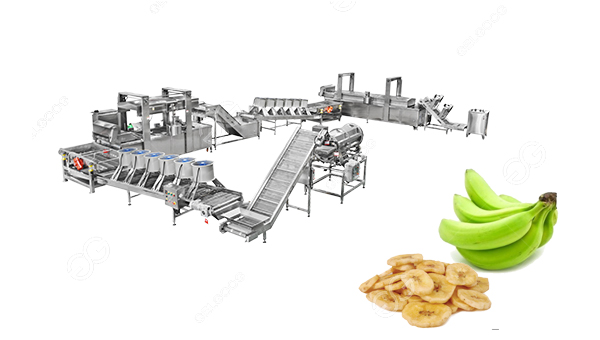In the heart of South America, Ecuador stands as a nation rich in biodiversity and renowned for its agricultural produce. Among its many treasures, bananas reign supreme, being one of the country’s major exports. However, in recent years, Ecuadorian entrepreneurs have sought innovative ways to add value to their banana industry. A customer from Ecuador bought our banana chips making machine, aimed at not only expanding production but also improving product quality.

The decision of an Ecuadorian customer to invest in an automatic banana chips making machine marks a strategic move towards modernization and efficiency in banana processing. Traditionally, bananas were primarily exported in their fresh form. However, with evolving consumer preferences and the demand for convenient, snackable products on the rise, the market for banana chips has experienced significant growth globally.
Recognizing this trend, the customer have seized the opportunity to capitalize on their abundant banana supply by venturing into banana chip production. However, the transition from fresh bananas to packaged chips comes with its challenges, particularly in ensuring consistent quality, shelf-life, and meeting stringent hygiene standards.
The introduction of automatic banana chips making machines addresses these challenges head-on. These state-of-the-art machines streamline the production process, offering efficiency and precision from slicing to packaging. Equipped with advanced technology, they can handle large volumes of bananas, ensuring a continuous supply of high-quality chips.
One of the primary motivations behind the investment in automatic machinery is the desire to enhance product quality. Manual processing methods often result in inconsistencies in thickness, texture, and flavor of banana chips. In contrast, automatic machines ensure uniformity, delivering crispy, golden chips with every batch. This consistency meets consumer expectations.
Moreover, the implementation of automated systems minimizes human intervention in the production process, reducing the risk of contamination and ensuring compliance with food safety regulations. This is particularly crucial for Ecuadorian exporters looking to maintain high standards and secure lucrative contracts in international markets.
Furthermore, the adoption of automated technology enables Ecuadorian customer to scale up their operations cost-effectively. By increasing production capacity and efficiency, they can meet growing demand both domestically and internationally, thereby expanding their market reach and boosting revenue.
Beyond the economic benefits, the investment in automatic banana chips making machines also contributes to sustainability efforts. By utilizing advanced equipment, producers can optimize resource utilization, minimize waste, and reduce energy consumption, aligning with global initiatives towards eco-friendly manufacturing practices.